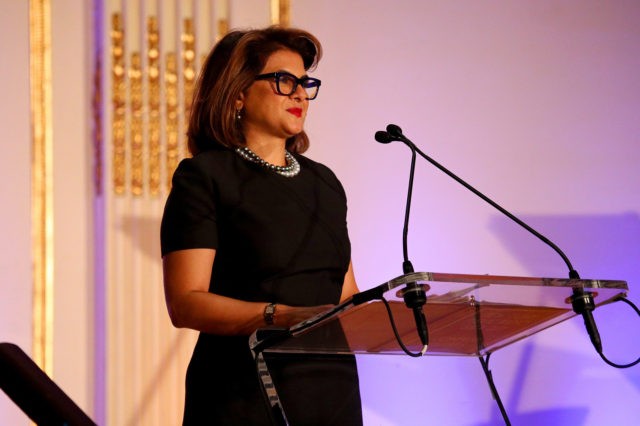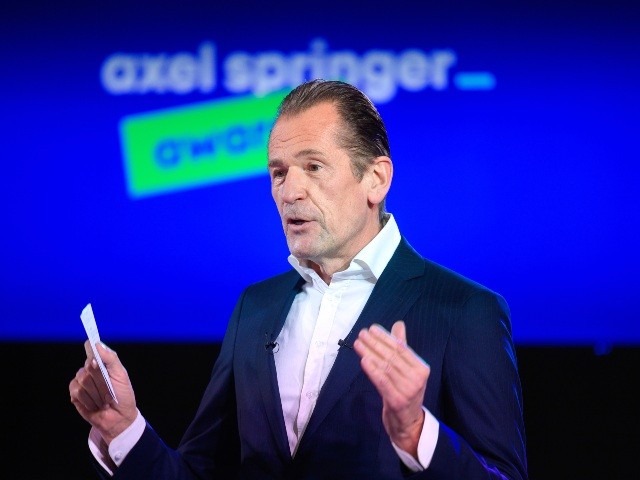Politico, the liberal political magazine that covers D.C. politics but is owned by a German media conglomerate, Axel Springer, is trying to paint Breitbart News as “on the same side” as Google and Facebook because it won’t join the corporate media in supporting the Journalism Competition and Preservation Act (JCPA), a bill that would create a news media cartel.
As Politico points out, aside from a few exceptions like Glenn Greenwald and Clay Travis, Breitbart News is virtually alone in the American news industry in opposing the legislation, which would allow companies like the New York Times and the Washington Post to team up in order to pressure tech companies for payouts and other forms of special treatment.

FILE – In this Jan. 28, 2016, file photo, billionaire Amazon founder and Washington Post owner Jeff Bezos talks about the history and character of the Post during a dedication ceremony for its new headquarters in Washington. Presumptive Republican presidential nominee Donald Trump told Fox News in an interview on May 12, 2016, that Bezos was using the Post to help Amazon avoid taxes. (AP Photo/J. Scott Applewhite, File)
Even conservative news organizations like Newsmax, Town Hall, and the Washington Examiner, hoping for similar benefits, are backing the bill, even though its goal is to protect the discredited corporate media from online competition.
If the (JCPA) passes, big corporate media companies would be able to form a legal cartel that could strike deals with Facebook, Google, Twitter, and other tech giants that would prioritize their content to the detriment of podcasters, YouTubers, Substack authors, and other forms of independent media.
A line in the bill allows members of the state-sanctioned cartel to exclude any company that is not “similarly situated” to them from the benefits of their negotiations with the tech giants, giving the cartel wide leeway to exclude any news organization of their choice.
It would also exclude any journalist who does not have “a dedicated professional editorial staff” that publishes news content on “at least a weekly basis,” blocking independent journalists who run small or one-man operations.
Politico, along with the rest of the corporate media, supports the legislation. Dr. Dietrich Von Klaeden, the senior vice president for public affairs at its parent company, German media giant Axel Springer SE, sits on the board of the News Media Alliance, a lobbying arm of the corporate media that has spent millions lobbying lawmakers on this bill.
Based in Berlin, Dr. Von Klaeden and his foreign media conglomerate hopes to radically alter the legal framework that governs the news industry in the U.S.
Despite Breitbart News standing virtually alone among the news industry in opposing the bill, the Politico article notes Breitbart’s singular influence on the hill:
In this case, one Republican congressional aide said GOP lawmakers are nervous about the backlash they could receive from Breitbart, an important player in the conservative media ecosystem, if they back the legislation on the news bill. This aide was not directly familiar with Breitbart’s discussions with lawmakers.
Politico also acknowledges that Republican lawmakers have flocked to Breitbart to condemn the legislation:
But the bill has also attracted major GOP critics such as Florida Sen. Marco Rubio, Tennessee Sen. Marsha Blackburn, House Minority Leader Kevin McCarthy and House Judiciary ranking member Jim Jordan of Ohio, all of whom have done interviews with Breitbart opposing the legislation. McCarthy told Breitbart that the bill poses “a tremendous threat to free speech and a free press,” alleging that it would harm start-up publications competing with established media companies.
At a Senate hearing on the bill yesterday, expert witnesses slammed the attempt to create a new corporate cartel in America.
“I cannot think of anything the country needs less, now or ever, than a national news media cartel,” said Dr. Daniel Francis, a Harvard law fellow and former FTC antitrust official.
“Cartels are the supreme evil of antitrust,” continued Francis. “They are so reliably harmful that we extradite and imprison people who form them, they are automatically illegal in civil litigation with no justification allowed at law, and for decades, the justice department has had a flagship policy project of fighting cartels and opposing exemptions just like this one.”
While Democrats pushing the bill, like lead sponsor Sen. Amy Klobuchar (D-MN) attempted to frame the JCPA as a bailout for local news, Media Research Center vice president Dan Gainor pointed out that it would actually benefit national news outlets and media conglomerates — like the one that owns Politico.
“The New York Times just spent $550 million in cash purchasing The Athletic, which according to journalist Aron Pilhofer, covers 270 plus sports teams in more than 47 local markets,” said Gainor. “The Times has placed itself in direct competition with every local news site for the same pool of subscribers. The Times already has more than 8 million paid subscribers… So why are we helping them?”
“The Washington [DC] area used to have a thriving chain of community weeklies. The Gazette was founded in 1959 and grew to a 550,000 circulation in suburban Maryland. They were closed down by their owners, The Washington Post, in 2015. In 2021, the Post achieved record-breaking digital advertising. It’s also owned by Big Tech billionaire Jeff Bezos. He purchased the company in 2013, two years before it killed the chain of weeklies. So why are we helping them?”
Allum Bokhari is the senior technology correspondent at Breitbart News. He is the author of #DELETED: Big Tech’s Battle to Erase the Trump Movement and Steal The Election.


COMMENTS
Please let us know if you're having issues with commenting.